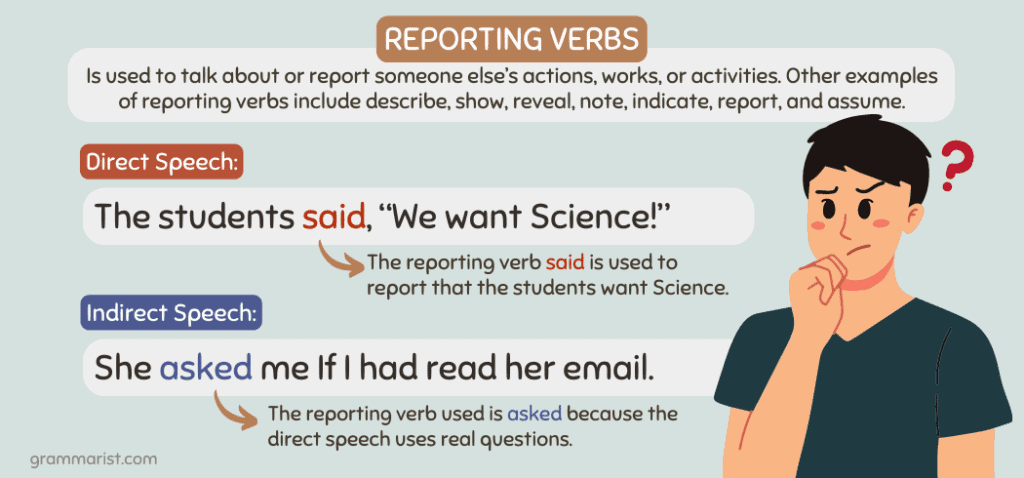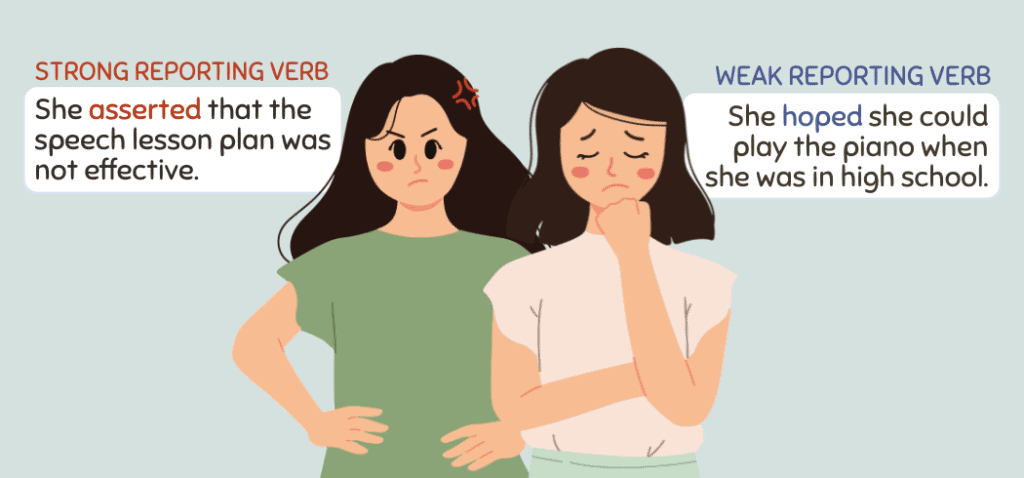Do you recall telling a friend what someone else said? You probably used a reporting verb in your story. What is a reporting verb? Good question and I’ve got the answer for you!
I use reporting verbs like say, tell, and state when talking about what other people have said.
But reporting verbs can be challenging because of the subtle shades of meaning and structure of sentences. I’ll teach you the common usage of reporting verbs and the meaning of strong, neutral, and weak reporting verbs.
What Are Reporting Verbs?

A reporting verb in academic writing is used to talk about or report someone else’s actions, works, or activities. Its usage is essential when you need to comment on someone’s research, agree or disagree with their arguments, and evaluate their claims.
Consider this example to see how these verbs are used.
- Direct speech: The students said, “We want Science!”
- Indirect speech: The students said they wanted Science.
In the second sentence, the reporting verb said is used to report that the students want Science.
Here’s another example of how to report indirect questions.
- Direct speech: “Have you read my email?”
- Indirect speech: She asked me If I had read her email.
The reporting verb used is asked because the direct speech uses real questions.
Other examples of reporting verbs include describe, show, reveal, note, indicate, report, and assume. Some informal verbs like come up with and guess are not recommended in formal writing.
Usage of Reporting Verbs
Reporting verbs follow specific patterns for their sentence structure. For instance, say uses the basic verb pattern:
- Say + (that) + clause
Here are some examples of usage of the reporting verb say.
- Mia said she had already eaten.
- Lily said she had known her before.
Another common reporting verb is tell. The correct verb form is:
- Tell + someone + (that) + clause
Here’s an example of the grammar usage of tell.
- I told Rain to visit me.
Some reporting verbs like agree and offer only use the verb infinitive instead of the verb object infinitive pattern. For example:
- I offered to give him a ride.
Accuse and congratulate follow the verb object preposition gerund pattern. For example:
- They accused the man of stealing the bread.
This example shows a change in the original verb form.
- Direct speech: “I will come to the event.”
- Indirect speech: He said he would come to the event.
The reported speech changes to the use of would. A simple future tense verb in direct speech uses this modal verb for indirect speech.
Remember to use a singular verb with an -s ending if the subject is singular and a plural verb if the subject is plural. For example:
- She suggests that dinner parties should be hosted every Friday.
- They suggest that dinner parties should be hosted every Friday.
What Are the Most Common Reporting Verbs?
There is a wide range of reporting verbs used for different purposes. Below is a reporting verb list used for suggestions.
- Advise
- Advocate
- Allege
- Assert
- Hypothesize
- Intimate
- Postulate
- Propose
- Recommend
- Suggest
- Theorize
- Urge
This list shows examples of reporting verbsthat show persuasion.
- Apologize
- Assure
- Convince
- Encourage
- Interpret
- Promise
- Persuade
- Threaten
- Warn
Here’s a list of academic reporting verbs.
- Advance
- Argue
- Assume
- Casts doubt on
- Comment
- Contend
- Emphasize
- Explain
- Highlight
- Imply
- Maintain
- Mention
- Observe
Strength of Reporting Verbs

Some verbs are stronger in their functions, while others are weaker. Let’s look at how strong and weak reporting verbs differ.
- The author assumes that verb patterns vary according to the reporting verb.
- The author insists that verb patterns vary according to the reporting verb.
Both assume and insist have similar definitions. But there are differences in meaning in terms of strength. The verb assume is weaker compared to insist. However, English is not black or white but a spectrum showing degrees of meaning.
Strong Reporting Verbs
Use strong reporting verbs for stronger arguments and claims. Here are some strong reporting verb examples.
- Argue
- Assert
- Believe that
- Challenge
- Claim
- Contend
- Maintain
- Refute
- Reject
- Urge
Here are some examples of strong reporting verbs in sentences.
- She asserted that the speech lesson plan was not effective.
- The judge maintained that his role would be to oversee the entire project.
Neutral Reporting Verbs
A neutral reporting verb says what another person describes, refers to, or discusses. The table below lists some neutral reporting verbs.
- Describe
- Demonstrate
- Examine
- Mention
- Note
- Point out
- Show
- State
- Reveal
Here are some sentences that use neutral reporting verbs.
- The teacher mentioned that she had been working on the speech quiz and speech worksheet.
- Eric stated that he could speak perfect Spanish.
Weak Reporting Verbs
Weak reporting verbs suggest much weaker functions. Check out this weak verbs list.
- Admit
- Alleges
- Comment
- Concede
- Guess
- Hope
- Question
Here are sentence examples that use weak reporting verbs.
- Linda guessed that subject-verb agreement is a common student error.
- She hoped she could play the piano when she was in high school.
Reporting Words Summary
The grammar of reporting verbs is easier than you think. Use this type of verb when reporting or discussing what another person said.
I hope my guide helped you understand the difference in meaning between strong and weak reporting verbs and their correct sentence structure. Hopefully, it also allowed you to construct any normal sentence with this type of verb.